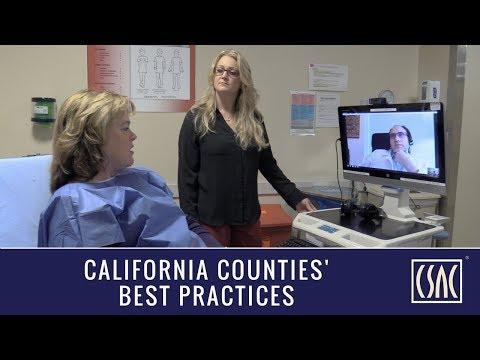Sutter-Yuba County Program Embeds Behavioral Health Workers in the ER
 In a perfect world, people suffering from a mental or
emotional health issue would be able to access treatment before
they were in crisis, but it doesn’t always work that way. They
often end up in the hospital emergency department. That’s why a
partnership between the Sutter Yuba Behavioral Health Department
and Adventist Health/Rideout Hospital in Marysville is making
such a big difference. They found a way to significantly reduce
the time it takes to evaluate and treat these patients. The
partnership between the Sutter Yuba Behavioral Health Department
and Adventist Health/Rideout is gaining statewide recognition
including a CSAC Challenge Award for innovative and effective
county programming.
In a perfect world, people suffering from a mental or
emotional health issue would be able to access treatment before
they were in crisis, but it doesn’t always work that way. They
often end up in the hospital emergency department. That’s why a
partnership between the Sutter Yuba Behavioral Health Department
and Adventist Health/Rideout Hospital in Marysville is making
such a big difference. They found a way to significantly reduce
the time it takes to evaluate and treat these patients. The
partnership between the Sutter Yuba Behavioral Health Department
and Adventist Health/Rideout is gaining statewide recognition
including a CSAC Challenge Award for innovative and effective
county programming.
“The emergency department acts as the safety net for everything,” said Doctor Derek Orchard, Medical Director of the Emergency Department at Adventist Health/Rideout. “It acts as the safety net if someone can’t get in to see their primary care physician in a timely fashion. And it goes hand in hand with someone dealing with a psychiatric emergency or mental illness, we become the safety net. It takes up beds, it takes up nursing staff, and the patient is not getting the care that they need and deserve.”
It’s important to know that Sutter and Yuba Counties operate a bi-county Behavioral Health Department. Tony Hobson, the Director of that agency, noted a significant increase in the number of people with behavioral health issues who were ending up in the emergency department at Adventist Health/Rideout. “I think we both realized that we had a problem in the community,” said Hobson. “And we came together and developed a solution. We just started talking and we put this (program) together and beautiful things have happened.”
Sutter Yuba Behavioral Health staff have been embedded in the Emergency Department at Adventist Health/Rideout. They are there 24-7 to help care for people who are experiencing an emotional or mental health crisis. “We’re doing a parallel process,” said Susan Redford, Emergency Psychiatric Supervisor with Sutter-Yuba Behavioral Health. “We need a medical clearance…and we also need our assessments, our safety plans, the necessary behavioral health work that needs to be done to get somebody placed.” As soon as the medical staff diagnoses a mental health issue, the county staff can begin arranging a psychiatric evaluation, longer-term placement if needed and other services.
In the past, just getting the evaluation could take a day or more, but now there is a contract in place with a company that provides access to psychiatrists over a video link, usually within a couple of hours as opposed to a couple of days. In addition to evaluations, telepsychiatry can also provide diagnoses and recommendations for medication and placement. So the three legs of the program work in concert; The Emergency Department provides physical health evaluations; telepsychiatry provides quick access to psychiatric evaluations and county behavioral health and social workers coordinate care and placement and provide other support.
And here’s the real benefit of the program. Many of the patients don’t need to be placed in a psychiatric setting; they can be sent home after a relatively short period of time. If they are okay medically and do not pose a threat to themselves or others, the county staff and psychiatrist can recommend they be released—often within 12-15 hours or so. That same process used to take up to two days.
Sending people home sooner with the right medications and a treatment plan is a far better outcome than spending several days in the emergency department. And for those who do need to be placed in a psychiatric facility, that happens sooner now, too. Theresa Hyer is the Director of the emergency department at Adventist Health/Rideout. “If every emergency room in California did the same exact thing, we would not have near the crisis we have today with our psychiatric inpatient beds, or lack thereof because only patients who truly need them would be there.”
This joint Sutter-Yuba County program is a recipient of a 2017 CSAC Challenge Award, which spotlights the most innovative programs in county government. The Call for Entries for the 2018 awards is now open.












































